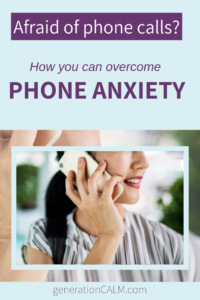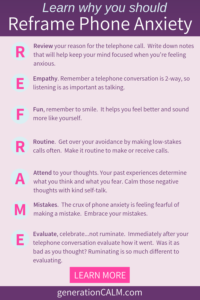Phone anxiety almost cost me my career
 I almost let my phone anxiety cost me my career.
I almost let my phone anxiety cost me my career.
Sounds dramatic but it’s true. And it’s something I’ve been too embarrassed to share before now.
Back in 2001 I was starting my first placement on my Clinical Psychology doctorate program. It was in a children’s psychology department in a busy, inner city hospital. My supervisor had already lined up several families for me to start seeing, and I enjoyed the clinical work tremendously.
I needed to make appointments with new patients as they came to the top of the waiting list. But there was one problem – my desk was situated in the largest open-plan office I had ever come across – and it triggered my long-forgotten phone anxiety.
My Phone Anxiety
My phone anxiety, where I was worried about coming across as stupid to the person on the other end of the line, was now magnified. I couldn’t pick up the phone and make these appointments because I would have been judged by all my peers sitting in the office.
My fear of being judged stopped me from picking up the phone and making the appointments.
My supervisor could not understand why I wasn’t taking other clients from the waiting list. Eventually I had to come clean when she said that I wouldn’t have enough clinical cases to pass my first placement.
It was so hard to admit that I had a phone anxiety when I was the one supposed to be helping children with their anxieties.
I had to strap on my big girl pants and just go for it. It’s all a distant memory now, but my world didn’t cave in when I made calls in front of my peers. I was probably sweating but I did it. And aced my placement.
My phone anxiety has eased over the years, but I still procrastinate about making appointments or calling people for information.
How to overcome your phone anxiety
Phone anxiety is quite common. People seem to think it is mostly a problem for millennials because they’re so used to texting or emailing instead, but phone anxiety has been around for as long as the telephone.
I like to use the acronym REFRAME to learn how to overcome phone anxiety. Because it’s time to take off your anxiety goggles and put on your reality spectacles. Reframe your phone anxiety so you can be daring and make a move forward.
If you prefer to watch my video rather than read about reframing your phone anxiety, you can do that here.
Reframe your phone anxiety so you can be daring and make a move forward.
R is for REVIEW.
Set your intention. If you are phoning a friend, is your intention to have fun, or help them feel less lonely? If you are calling the dentist, your intention might be to make a convenient time for your next checkup.Set your intention for the phone call before you pick up the phone. It will make your mind clearer.
Review also includes writing down some notes (not scripting out) to gently remind yourself certain questions or points you need to get across. When you get anxious it’s easy to get off track because your brain becomes less focused. Notes will help.
E is for EMPATHY.
Remember being on the telephone is a 2-way conversation. There’s both a talking and listening component. Don’t forget to listen. Take the pressure off you having to talk and allow silence to let the other person talk. Silence is OK.
F is for FUN.
I know, I know, phone anxiety does not allow time for fun. But at least smile while speaking on the phone, even if it’s forced. Smiling while talking will lift your mood and, although imperceptible, makes you sound more positive to the person on the other end of the line.
R stands for ROUTINE.
You are probably here because you are currently avoiding having to make or answer phone calls. Avoidance is what keeps a fear strong. So when you let the call go the voicemail, or you text someone or book an appointment online, you are strengthening the fear connection.
Start making telephone conversations routine by starting small. Make short, low-stakes phone calls such as ordering takeout, calling to find out the film times at the cinema. Do it often and do it scared – it becomes so much easier and less threatening over time.
A stands for ATTEND.
Pay attention to your thoughts. When I avoid using the phone it’s because I think I’m going to say something stupid, or forget to say something important, or I’m inconveniencing the other person and I’ll be judged poorly by them.
But if I were to get 10 people with phone anxiety all in the same room (what a sweet moment that would be…I’d be with my people) and ask them what goes through their mind. Everyone would have a different answer.
You see, your past experiences determine what you think and what you fear. And your experiences and upbringing and culture are different from mine. So our thoughts are different. But what we do have in common is that we are thinking mostly negative thoughts about the phone call.
Be kind to yourself. Calm those negative thoughts with kind self-talk. Like you would talk to a child or a good friend. In comparison to self-critical thoughts, kind words make you feel safe and more confident. (You might want to read my blog post about how to be less negative).
M is for MISTAKES.
This is it! This is the crux of phone anxiety. You’re fearful of making a mistake. Well, fear no more, embrace your mistakes.
If you are calling a receptionist, they speak to so many people in a day they are not going to remember your mistake. And if you are calling a friend, well what kind of friend is it who will dump you over saying something stupid?
If you make a mistake, what’s the worst that could possibly happen?
Ok, and then what?
And even if you make a mistake, as you inevitably will because no one is perfect, it’s OK. The world will not stop turning, Downton Abbey will still come to the theaters in September and you will still be liked. Yes really! There is a theory in psychology called the Pratfall effect and it means that people like you more if you make a mistake. (In which case I should be the most popular woman on the internet).
E is for EVALUATE, CELEBRATE …NOR RUMINATE.
I know, it’s not one word. But this is important!
Immediately after your telephone conversation evaluate how it went. How do you feel? Was it as bad as you thought? Do you feel a sense of relief or proud that you did it?
Now you can celebrate. Grab a fancy cup of coffee, do a yoga session, pat yourself on the back. You did good. It might seem small to someone else, but to you and me, we know the significance.
Please, for the love of Mary Berry, do not go down the dark spiral of ruminating over the phone call. Ruminating is so much different to evaluating. It means you constantly replay the conversation over in your head and doubts start to arise over whether you said something to upset the other person, or whether you said the wrong thing, or come up with a better way you could have answered a question.
The conversation is over. Done. You can bet the other person isn’t thinking anything of it.
What if I want long-term phone anxiety treatment?
Knowing what exactly scares you about using the phone is going to be helpful moving forward.
I encourage you to keep a journal to figure this out. Write out your thoughts about a situation, write down previous phone call experiences that you found difficult, notice your thoughts as you approach a time when you know you need to use the phone. Label your emotions tied to the phone anxiety.
These questions may help you understand your phone anxiety better:
- Is it easier to call some people (e.g., your parents) than a work colleague?
- Are you more nervous about calling someone you don’t know?
- Which calls are you most likely to avoid?
- Do you find video calls and face to face interactions easier than over the phone?
- Do you find it more difficult to place a call or to receive a call?
- Do you fear making calls in public?
- Are you afraid of making a mistake, making someone angry or dialing a wrong number?
- What’s the worst-case scenario?
- How much of a problem has your telephone phobia become? Is it a problem at work? Is it a problem when you are expected to make doctors appointments?
- What sensations occur in your body when you make a telephone call?
- What is your impulse? To avoid the phone?
As with any phobia, avoidance strengthens the fear. So when you avoid picking up the phone you are making yourself feel better in the short-term, but your phone anxiety has strengthened that little bit more.
Cognitive-Behavioral Therapy (CBT) is still the most trusted therapy to overcome fears and anxieties. It combines exposure training (getting you used to using the phone), with challenging your negative thoughts and beliefs. Together you and your therapist will decide on the course of action, which generally involves facing your fear gradually, and it is very practical.
Deciding whether to enter therapy for your phone anxiety is very much a personal decision but is generally preceded by the anxiety interfering with your life in some way.
If you’re not ready to go down the therapy route, Whitney Glen, LPC has a great article on strategies you can do at home to encourage you to pick up the phone.
If you take away one thing today
This maybe a lot to take in, so pin this for later and come back to it. Or you can watch my YouTube video about phone anxiety.
Remember, having some anxiety is normal. The idea is not to take away anxiety completely. You want to be able to make that telephone call while scared…because that’s where the growth happens.
It will get easier over time. Do something about it before it gets in the way of life, like it did for me.
What would you do today if you weren’t scared of talking on the phone?

